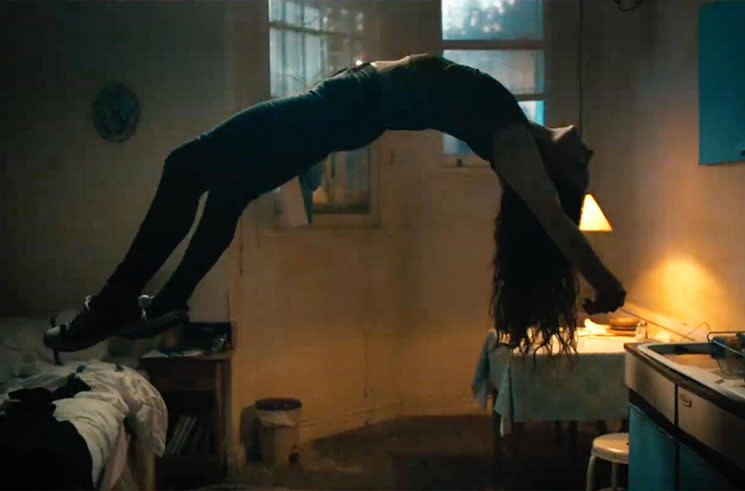Rose Glass's directorial debut, Saint Maud, is a story about pain. Physical pain, pain as punishment, sickness pains, existential pain and the pain of human loneliness. Maud, the saint, (Morfydd Clark) is a young nurse channelling her righteous faith into her work caring for "decrepit and dying" cancer patient and former dancer, Amanda (Jennifer Ehle). It's Maud's mission to amend Amanda's soul with God before she passes — and the work gives her immense pleasure, perhaps too much. They spend all their time together; Amanda humours Maud's attempts to save her, at first, until it becomes evident that Maud's faith finds her teetering gleefully between homophobia and homoeroticism — performing a nauseating balancing act between holy and hellish on her patient's unwitting behalf.
Amanda's existence represents to Maud the sins of the mortal plane. To her, the dancer's opulence and frivolity only thinly mask her wanting soul. Vicariously atoning for Amanda's sins, Maud begins punishing herself. The film tastefully tiptoes into body horror in these moments, and with visceral squelching and sizzling sound effects, Maud's physical punishment is transmuted into her emotional — borderline sexual — pleasure.
Shot entirely from Maud's perspective, the film intentionally blurs the line between its deranged protagonist's extraordinary delusions and supernatural or religious phenomenon. Are these otherworldly occurrences miracles from God? Or are they elaborate fictions of a sick mind? Maud's darkest points find her reconciling with Amanda's lavish and colourful mansion atop a hill where her connection with the Lord wanes. When she's making progress, she's roughing it in a dingy apartment wearing rags, walking on bloodied toes and cavorting with strange men. These juxtapositions are no accident, of course.
But through it all, Maud's monstrousness is vetoed by her innate humanity, her need for connection and purpose. You can't help but feel sorry for her. That is the best kind of horror — the kind that finds its audience sympathizing with evil. Saint Maud has all the makings of a classic; its religious overtones are insulated by a minimal, but impactful cast. Its set design is niche, yet believable. And its effects are never used gratuitously — only ever employed a handful of times, each time used to induce full-on body cringe.
(Elevation Pictures), (Elevation Pictures)Amanda's existence represents to Maud the sins of the mortal plane. To her, the dancer's opulence and frivolity only thinly mask her wanting soul. Vicariously atoning for Amanda's sins, Maud begins punishing herself. The film tastefully tiptoes into body horror in these moments, and with visceral squelching and sizzling sound effects, Maud's physical punishment is transmuted into her emotional — borderline sexual — pleasure.
Shot entirely from Maud's perspective, the film intentionally blurs the line between its deranged protagonist's extraordinary delusions and supernatural or religious phenomenon. Are these otherworldly occurrences miracles from God? Or are they elaborate fictions of a sick mind? Maud's darkest points find her reconciling with Amanda's lavish and colourful mansion atop a hill where her connection with the Lord wanes. When she's making progress, she's roughing it in a dingy apartment wearing rags, walking on bloodied toes and cavorting with strange men. These juxtapositions are no accident, of course.
But through it all, Maud's monstrousness is vetoed by her innate humanity, her need for connection and purpose. You can't help but feel sorry for her. That is the best kind of horror — the kind that finds its audience sympathizing with evil. Saint Maud has all the makings of a classic; its religious overtones are insulated by a minimal, but impactful cast. Its set design is niche, yet believable. And its effects are never used gratuitously — only ever employed a handful of times, each time used to induce full-on body cringe.




